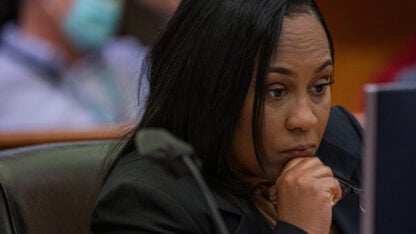Rep. Chris Erwin finally won a seat in the Georgia legislature after a chaotic campaign in which a judge threw out the first election and ordered the vote to be redone in December. Now a court has ruled that illegal votes tainted the second election, forcing Erwin to prepare to step down and run for the job a third time less than a month after he was sworn into office.
“It’s frustrating, I won’t say any different,” said Erwin, who’s already seeing signs of do-over deja vu in his district. “I drove to the dentist this morning and I rode by and noticed three of my campaign signs had been put out already.”
Erwin and the fellow Republican he thought he had defeated twice last year, former state Rep. Dan Gasaway, are heading for a third showdown at the polls in state House District 28 in northeast Georgia. That’s after a Superior Court judge found illegal votes tainted both the initial GOP primary last May as well as the special do-over election held Dec. 4.
It’s yet another example of problems Georgia voters faced at the polls in 2018. In some cities, voters had to wait two hours or more to cast ballots Nov. 6. Pending lawsuits accuse Georgia officials of enforcing strict voter ID rules and other policies that violated citizens’ voting rights. Meanwhile, state officials are working to replace paperless electronic voting machines that security experts have warned are vulnerable to hackers.
Attorneys for both Gasaway and Erwin said errors that tainted both elections originated with local officials. Secretary of State Brad Raffensperger, who oversees elections in Georgia, said Thursday his office is investigating whether vote fraud played a role, but gave no details.
Republicans keep the seat no matter who eventually wins. No Democrats ran in the district that spans Banks, Stephens and Habersham counties in the foothills of the Appalachian Mountains.
Facing the loss of a seat he’d held since 2013, Gasaway challenged the May primary election in court after losing by 67 votes. A judge from outside the district was brought in to hear the case, and ruled mapping errors allowed some who didn’t live in Gasaway’s district to vote.
The December do-over election was even closer. Erwin won again by just two votes, and Gasaway went back to court. After hearing four days of testimony, the same judge on Feb. 1 threw out the second election. Judge David Sweat found that four voters cast illegal ballots — enough to have potentially tipped the race.
Gasaway said his refusal to concede to a fellow Republican hasn’t been popular with some in the GOP.
“I’ve been called every name known to man,” Gasaway said. “I have seen some parties who thought it was sour grapes the first time, and now see that I’ve been right twice, who are realizing we have a real problem now and Dan might not be crazy.”
All four instances of illegal voting cited by the judge occurred in Habersham County. One voter showed up as having voted twice. Three others were found to have cast illegal votes in the race because they had moved outside the district.
“It does sort of boggle the mind,” said Cathy Cox, Georgia’s secretary of state from 1999 through 2007 and now the dean of Mercer University’s law school. “When you have to redo any election, you would hope that everybody involved would flyspeck any of the places where there was potential for error… But we’re all humans.”
The elections supervisor for Habersham County, Laurel Ellison, said in an email Friday that county officials had asked the secretary of state to investigate “possible voter fraud due to a double vote.” She said the new election will likely be held April 9 but gave no further comment. Ralph Taylor, the attorney who represented the county in court, did not immediately return phone and email messages.
Jake Evans, Gasaway’s attorney, said election workers in Habersham County failed to catch voters who had moved outside the district even after they signed in at the polls under addresses that didn’t match their voter registration.
“The crux of this case was just letting people to continue to vote in a district they had moved out of and provided notice,” Evans said.
Erwin’s attorney, Bryan Tyson, argued the three voters who had moved still should have been allowed to vote because Georgia law gives voters time to change their registration before they can be removed from the rolls at a former address.
“It’s a complicated question of what is the duty of the voter and what is the duty of the registrar when you move somewhere else,” Tyson said. “I think everybody worked really hard here to get it right.”
Tyson said he hasn’t decided whether to appeal. The judge’s ruling requires Erwin to step down from the House, likely leaving the district’s more than 50,000 constituents with no representative until after the 2019 legislative session ends.
It’s not the first Georgia election to require a double do-over. Courts twice tossed out results of the District 1 state House race in November 2002 and again in January 2003, citing confusion over which voters were eligible after the northern Georgia district’s boundaries were redrawn. Democratic Rep. Mike Snow won re-election after the third round of voting in July 2003.









